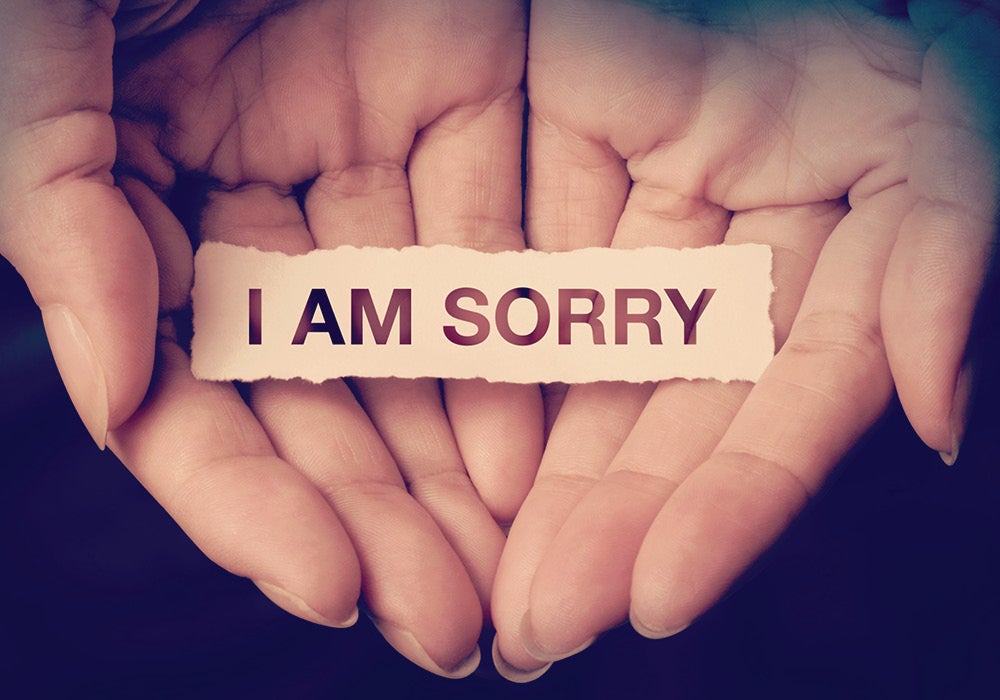Whoever said “Love means never having to say you’re sorry” must have been married to a stuffed unicorn. Or a plastic potted plant. Because if they were in a relationship with another human being, that statement likely turned into “Love means I’m on a dirt road to a major break up or divorce court because I never say I’m sorry.”
Let’s face it. Even healthy, happy couples argue – and sometimes they fight dirty. Despite the hard work you put into your relationship, despite the hours you spend on your own personal development and managing your mental states, and certainly, despite your best and most loving intentions, you won’t always handle relationship conflict well. We all mess up and sometimes we mess up quite grandly with a full display and broad range of emotion. (I admit, I’m not proud of it).
And….our kids need to see us work through our issues and come back together strong! That is the exact way they LEARN to resolve their own conflicts. Remember: More is caught than taught.
Repent
Honestly, if I had a dollar every time I’ve had to take ownership of my own pride and change course, I’d be filthy rich. Some of our relational mishaps are foolish and unintentional. Sometimes they’re not. Sometimes we launch targeted attacks on our person where they are most vulnerable. That is, we intentionally damage the intimacy between us because we have been triggered and gone completely offline. So, what’s the best course when we wound others with our words?
Most of us would answer “Apologize,” but our culture has misunderstood the various uses of the word. A true apology is actually providing a defense for your actions. The word apology comes from the Greek word apologia, which literally means to “defend” or “vindicate.” It may include some sort of “regretful acknowledgment,” but that isn’t its main purpose. Rather, when we “apologize” for something, we are actually seeking to justify it. We might also be asking the person to whom we are offering it for their understanding about the circumstances or the reasons for our actions. But an apology is not necessarily a commitment to change.
However, when we wound someone with our words, the best course of action is to express ruefulness or remorse and combine this with the commitment to change. This is called the act of repentance. The word repent is an oldie but a goodie, and it’s a wonderful little verb if you feel like being humble. To repent simply means to change; to express contrition or remorse, then go in a different direction. Tacit in the word is the idea of sorrow & regret. Most understand this as the simply expression “I’m sorry.” No excuses, no defense. Just I’m sorry.
For more on this distinction, see two examples here.
Repair
Repairing an offense involves two people. There is the giver and the receiver. The remorse must be offered, and it must be accepted. An expression of remorse (I’m sorry) that heals is one that is grounded in kindness, generosity, and compassion. I’ve hurt you and I realize it. As the offender, you offer your repair. You express remorse with a kind heart, voice, and words. You attempt to renew the connection and bring the two of you back together again.
But you cannot repair it alone. Even Buddha himself could say I’m sorry and it wouldn’t be effective unless the recipient accepts it with grace and offers something in return: forgiveness. When you have hurt me, I see you struggle. And I care about you, so I hear your apology with a kind heart, ears, and mind. And then I forgive you. Without my forgiveness, our rift cannot heal.
So, we, the offender and offended bear equal responsibility for bringing together that which was torn apart. Our relationship is something we each take full responsibility for. My mindset causes my unhappiness, not you. So even when you’ve said something cruel, I decide to let it go – to see beyond the temporary clouds of fear, ego, and story to love underneath. So yes, my dear, I forgive you. I forgive you for your humanity, your flaws, your missteps and this latest offense. And I ask you to do the same for me when I fail. After all, we are all in the same sandbox!
Here is a repair manual for when something you’ve said has upset your friend or spouse (And let’s not forget that spouses are supposed to be friends also). “I’m truly sorry” is a good start, but for a sincere expression of remorse to rebuild intimacy, it should have three qualities:
- If you have said something unfair, first you need to OWN IT. Take full responsibility for the mistake.
- Second, attempt to repair the damage by speaking truth to your person. Tell them what you wished you would have said, rather than what you actually did say. THIS IS KEY. Merely saying “I’m sorry” is not very robust, no matter how sincere. Repairing the damage means changing the understanding of your partner.
- Third, you need to commit to improve.
So, practice saying, “I’m sorry” in the form Own, Repair, Improve. I did X (own), I’m sorry (repair), and I’m going to do Y (improve). It might sound something like this: “Sweetheart, I want to acknowledge that I said I hate going to see you play volleyball and that watching sports is a waste of time. That was a mean thing to say (own). Sometimes I’m selfish about my time, and that’s not fair to you. I’m sorry I said that (repair). Next time you ask me to come to a game, I’m going to say yes (improve).” You can include some humor for bonus points: “But hey, let’s be real, you married a philosopher who can’t throw a ball, what do you expect? I love you.”
Resolve
True repair in any circumstance must involve resolution. And to resolve wrongdoing there has to be forgiveness. Forgiveness is amazing and powerful, and its effectiveness in healing relationships is truly ubiquitous. Forgiveness says something like, “I will continue to relate to you in a loving way, and I will not put up walls to keep you out. I will be vulnerable as I was before, and trust you and give you access to my heart.” Depending on the offense forgiveness may take time. Nevertheless, without it, repair never really takes place, and usually instead, bitterness happens. Forgiveness is life-giving, and bitterness is life-stealing. One fascinating aspect about forgiveness is that without it, our physiology suffers. Research shows that when we harbor bitterness, our bodies get sick and a system failure happens earlier in life on average.
Forgiveness is great you say, but about forgetting? When we are tragically hurt, we may never completely forget. Experiences of life are encoded in our neural pathways and can simply come to mind from time to time. But even though directly forgetting may not be a choice, we can always forgive. Granted, forgiveness is a choice we may need to make over and over again. When refused to forgive, we harbor bitterness. When we bitterly recall something our partner said or did that hurt, we are no longer in the present moment. We are reliving a past experience that no longer exists. We are choosing to suffer here and now based on a story, and are tainted by the past.
By choosing to forgive your partner, you exhibit compassion for them. You choose to have mercy and to extend grace. In so doing, you also choose to have self-compassion and to forgive yourself because you make mistakes too. “I forgive you” is a good start to accepting someone else’s “I’m sorry.” But if you aspire to be in a generous relationship, three steps bode well for the receiver.
- 1st – Thank your partner for caring so much about you and your relationship.
- 2nd – Acknowledge that your partner has owned their mistake and is attempting to repair it.
- 3rd – Actively accept the apology and move toward the person to connect.
So practice saying “I forgive you,” in the form Thank, Acknowledge, Accept. Thank you for saying X (thank), I appreciate you owning what you said (acknowledge), and I forgive you for Y (accept). It might sound something like this: “Thanks for saying that (thank). It made me upset when you were rude about my baseball game. I felt like you aren’t interested in the sport I love. It takes guts to admit you were mean (acknowledge). It’s okay. I accept your apology. I’d love it if you would come to the Volleyball game Wednesday (accept).” You can include humor here too for bonus points: “And hey, maybe we listen to one of your boring lectures on YouTube over some decaf later!”
Begin Again
Unfinished business accumulates. Let go of the slights and the large wounds so they don’t pile up. Practice dual apologies often. Love means saying I’m sorry. I forgive you. And begin again, in that very moment, as friends, and as generous lovers. Because your partner is a lot more fun than a stuffed unicorn.
Strang S., Utikal V., Fischbacher U., Weber B., Falk A. “Neural correlates of receiving an apology and active forgiveness: an fMRI study.” PLoS ONE. 9:e87654 (2014). 10.137.


No responses yet